Why you can trust Tom's Hardware
Gaming Benchmarks on Intel Core i9-13900KS — The TLDR
You can find the particulars of our overclock and test setup further below. Here we have the geometric mean of our gaming tests at 1080p and 1440p, with each resolution split into its own chart. We're testing with an Nvidia GeForce RTX 4090 to reduce GPU-imposed bottlenecks as much as possible, and differences between test subjects will shrink with lesser cards or higher resolutions and fidelity. You'll find further game-by-game breakdowns below.
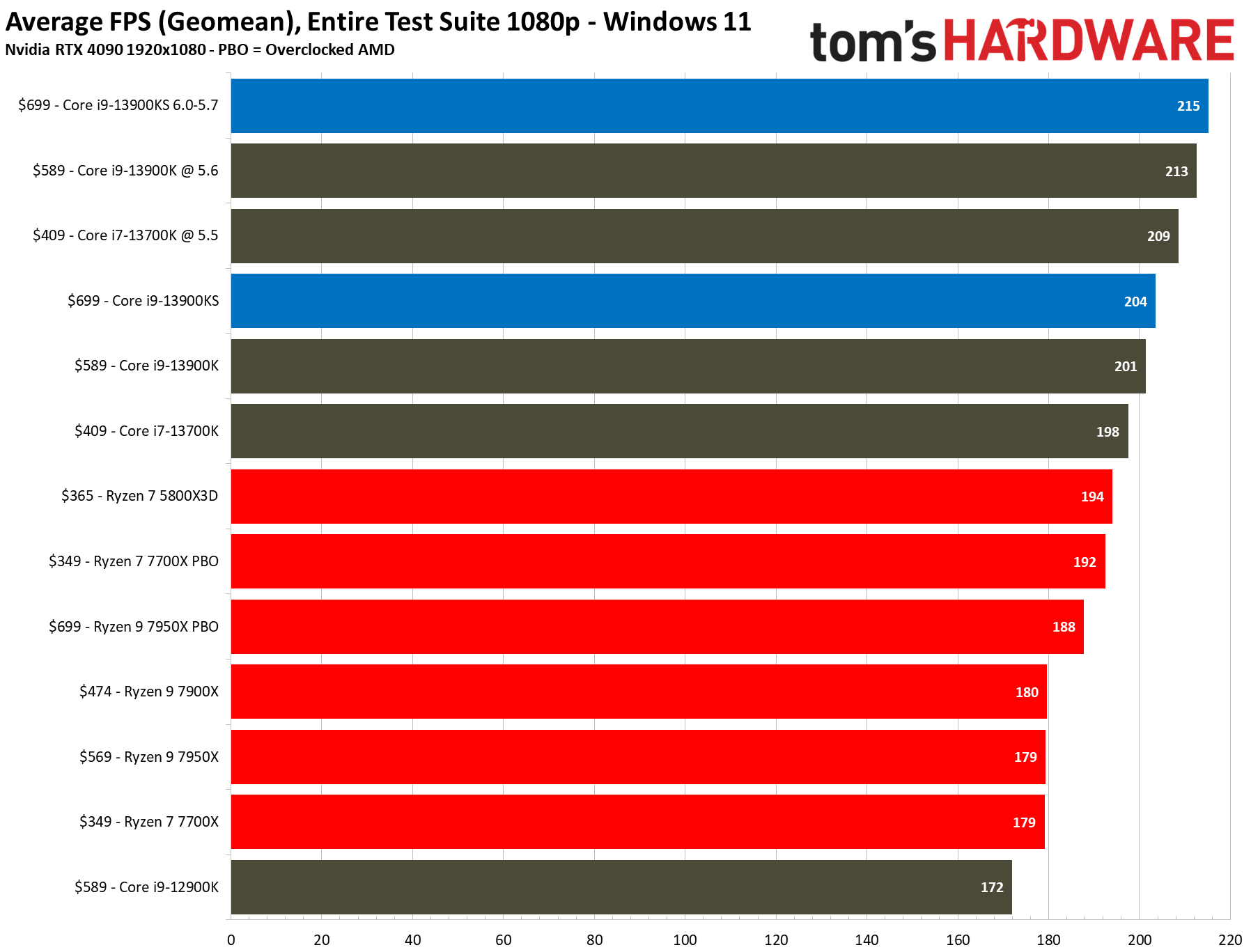
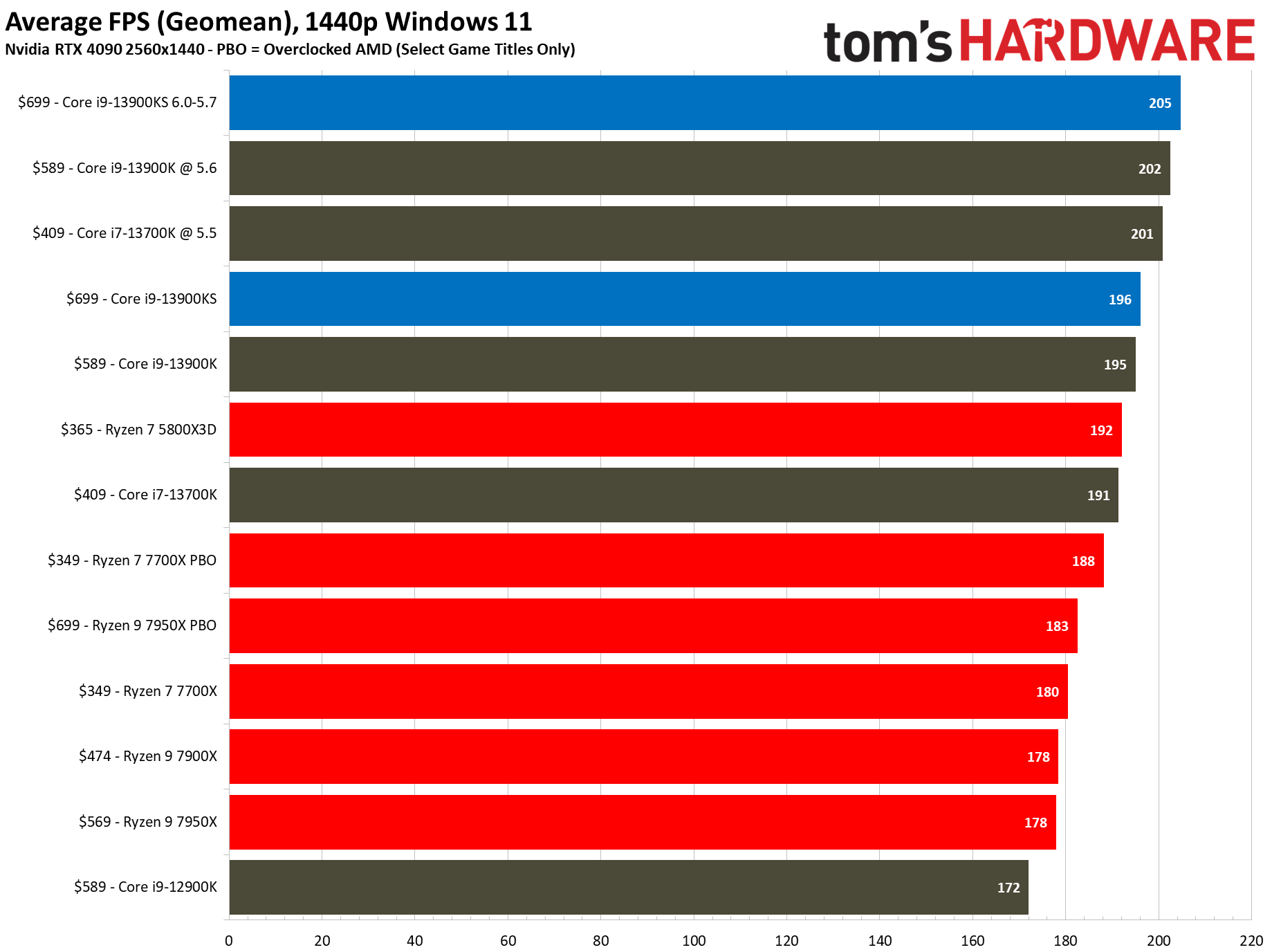
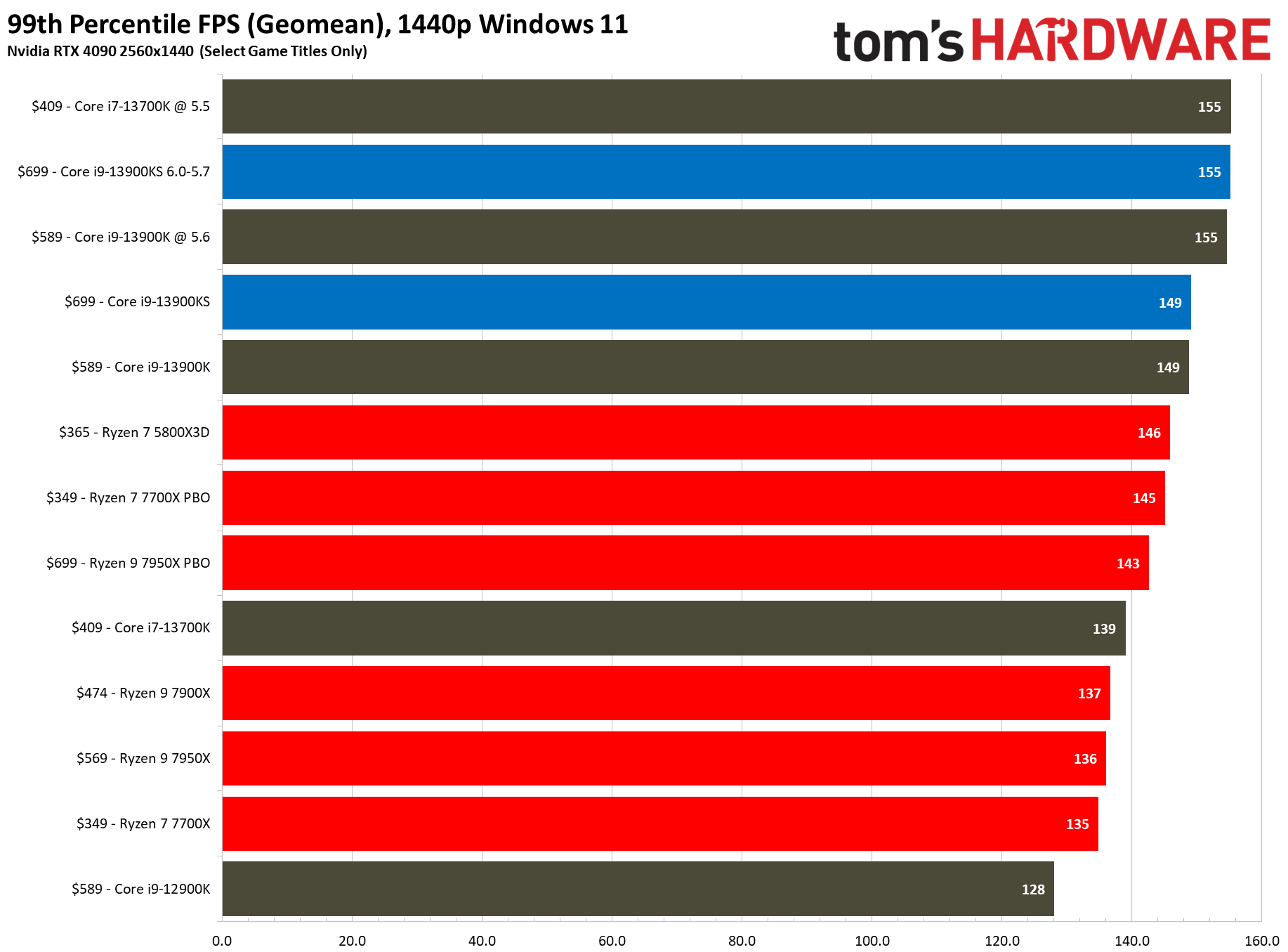
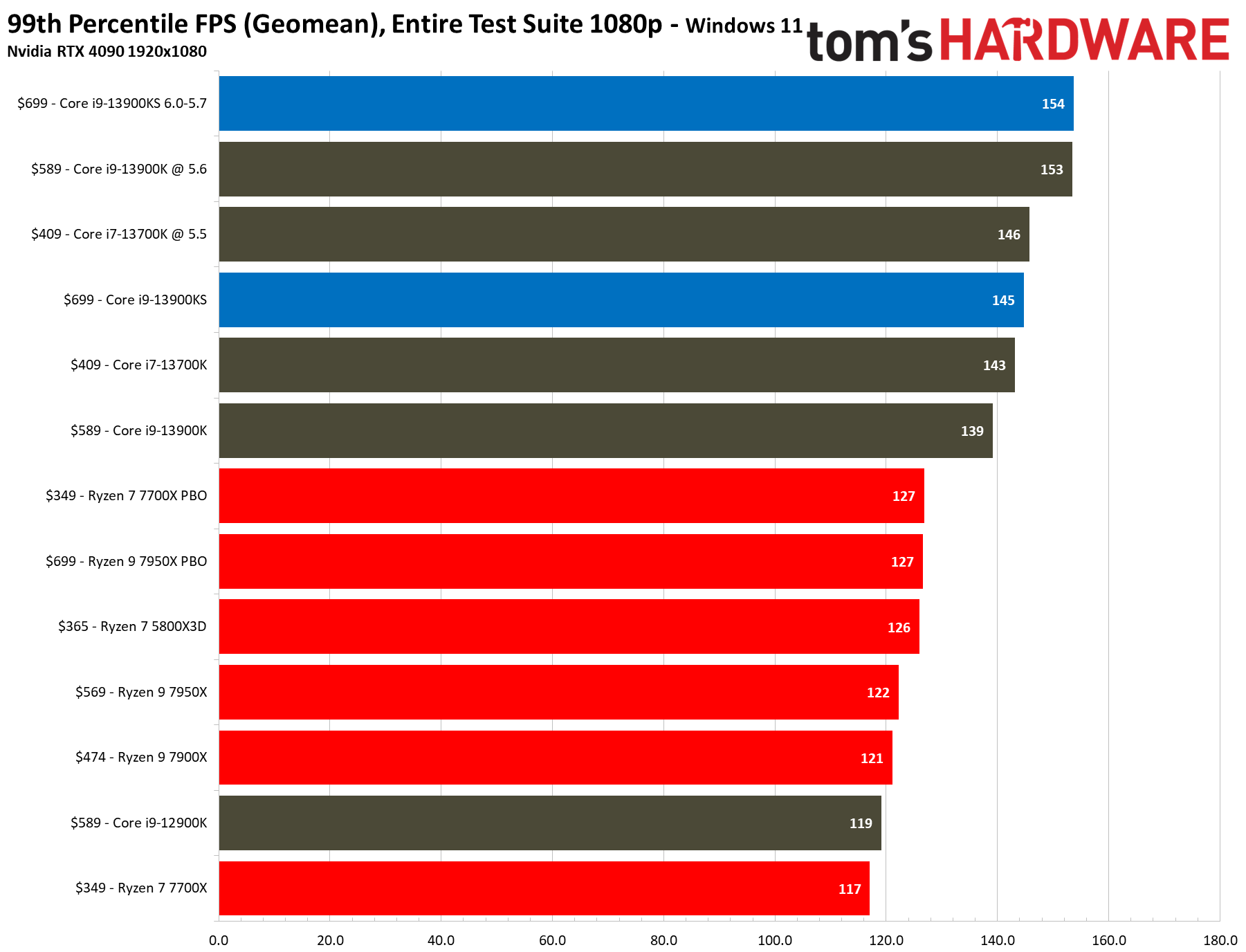
The Core i9-13900KS is now the fastest gaming CPU in the world, but only by a hair. Using a geometric mean of our 1080p gaming results, the $699 Core i9-13900KS is a mere 1.5% faster than the standard $589 13900K. That's imperceptible to most users and certainly not worth the extra ~20% you'll pay at retail. Further, the performance delta shrinks to a mere 0.5% with 1440p gaming, so you absolutely should not buy the KS model for gaming only.
The Core i9-13900KS contends with the $699 Ryzen 9 7950X in the pricing department, but the standard Core i9-13900K model already holds a strong enough lead in gaming to make the extra $110 for the KS model a non-starter for most of us.
Naturally, the pre-binned Core i9-13900KS will appeal to overclockers — your odds of scoring a cherry chip are increased dramatically. However, you're still at the whims of the silicon lottery with both the KS and the K model, so you could get lucky with either chip.
In fact, our tests didn't show a very big lead for the KS model over the K, and we could have likely dialed in a 5.9 GHz overclock on two of the K model's cores and reduced the delta further. Not that there's a big difference between the chips anyway — the overclocked KS model was only 1% faster than the K-series model after overclocking.
Overall, the KS model doesn't make much of a difference to the positioning of the 13th-Gen processors against the Ryzen lineup, and it is a poor value. This chip will appeal to deep-pocketed individuals either intent on building the highest-end system imaginable or extreme overclockers chasing world records. The Core i7-13700K remains the chip to beat if you're looking for a high-end gaming and productivity chip, as the 13900KS is only 2.5% faster yet costs a whopping $290 more.
The Ryzen 7 5800X3D is the fastest AMD gaming chip by far due to its 3D V-Cache, but its extra 96MB of L3 cache doesn't accelerate all games, and you'll also have to accept much lower performance in just about every other type of productivity application. If you're looking for an exotic 3D V-Cache gaming chip, your best option is to wait until next month when AMD launches the new Zen 4-powered Ryzen 7000X3D models. These chips look like they'll have a much more balanced performance profile and might beat the KS model in gaming, too.
The deltas in these charts can be slim, and large deltas in individual game titles, like with the 5800X3D, impact cumulative measurements. The competition between AMD and Intel chips can vary based on the title and the GPU you use. It's best to make an informed decision based on the types of titles you frequently play, so be sure to check out the individual tests below.
The individual game benchmarks below are predictable — the KS reliably scores one to two percent higher than the standard K model across the board. As such, we won't comment on the individual game results below.
| Tom's Hardware | 1080p Game Benchmarks |
| $699 — Core i9-13900KS / OC | 100% / 105% |
| $589 — Core i9-13900K / OC | 99% / 104% |
| $409 — Core i7-13700K / OC | 97% / 102% |
| $365 — Ryzen 7 5800X3D | 95% |
| $474 — Ryzen 9 7900X | 88% |
| $699 — Ryzen 9 7950X / OC | 88% / 92% |
| $349 — Ryzen 7 7700X / OC | 88% / 94% |
Cyberpunk 2077 on Intel Core i9-13900KS
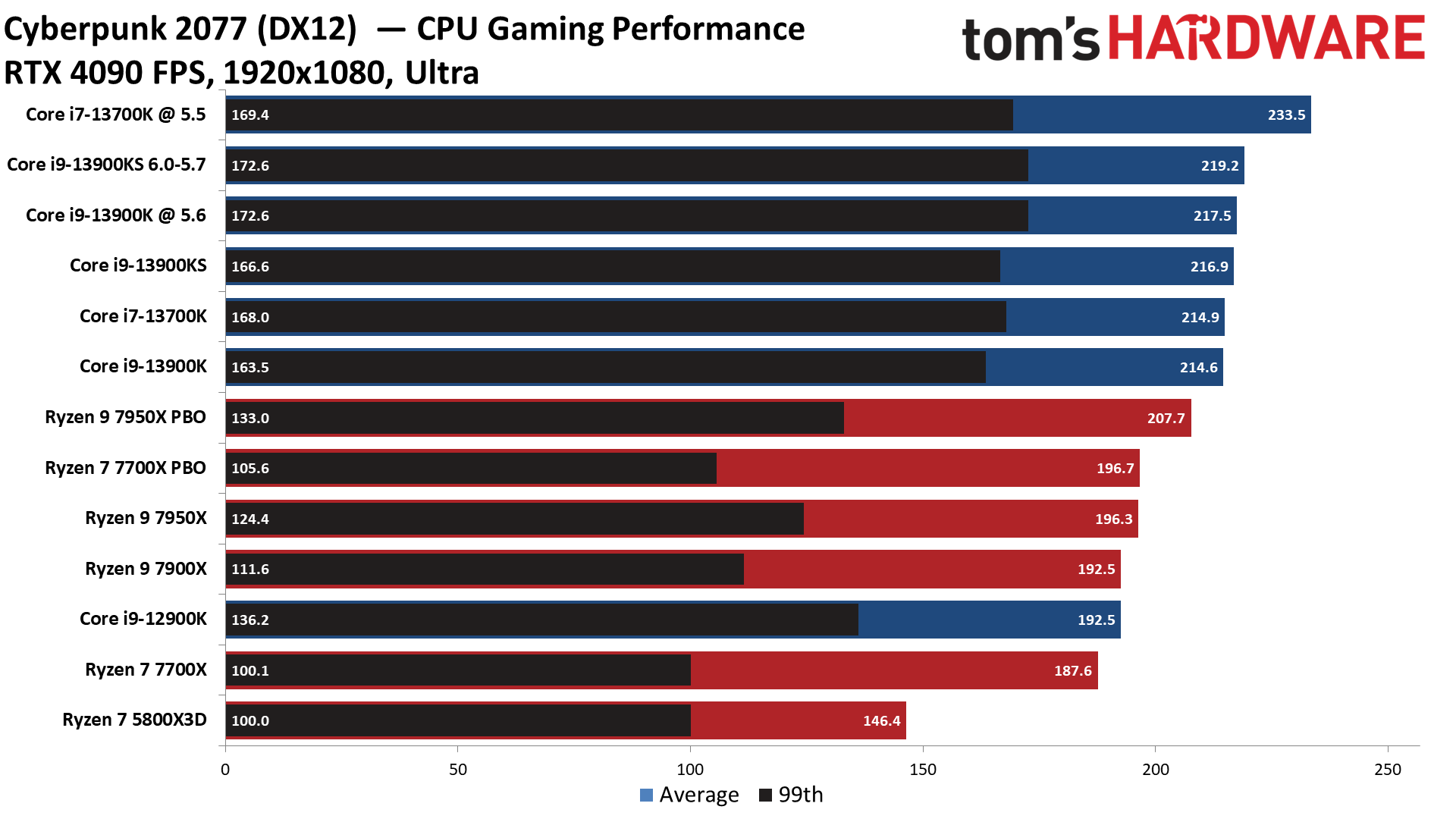
Far Cry 6 on Intel Core i9-13900KS
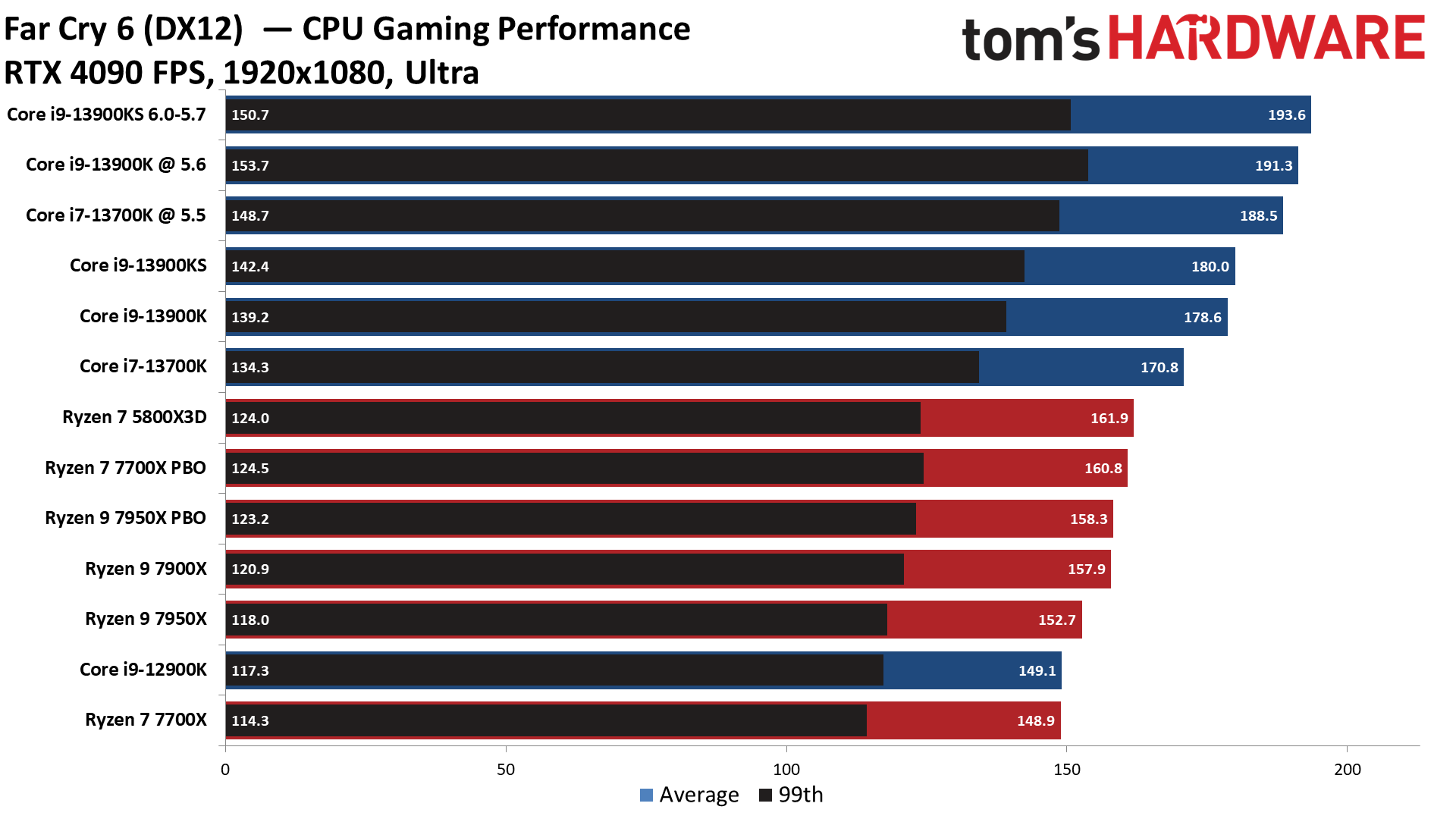
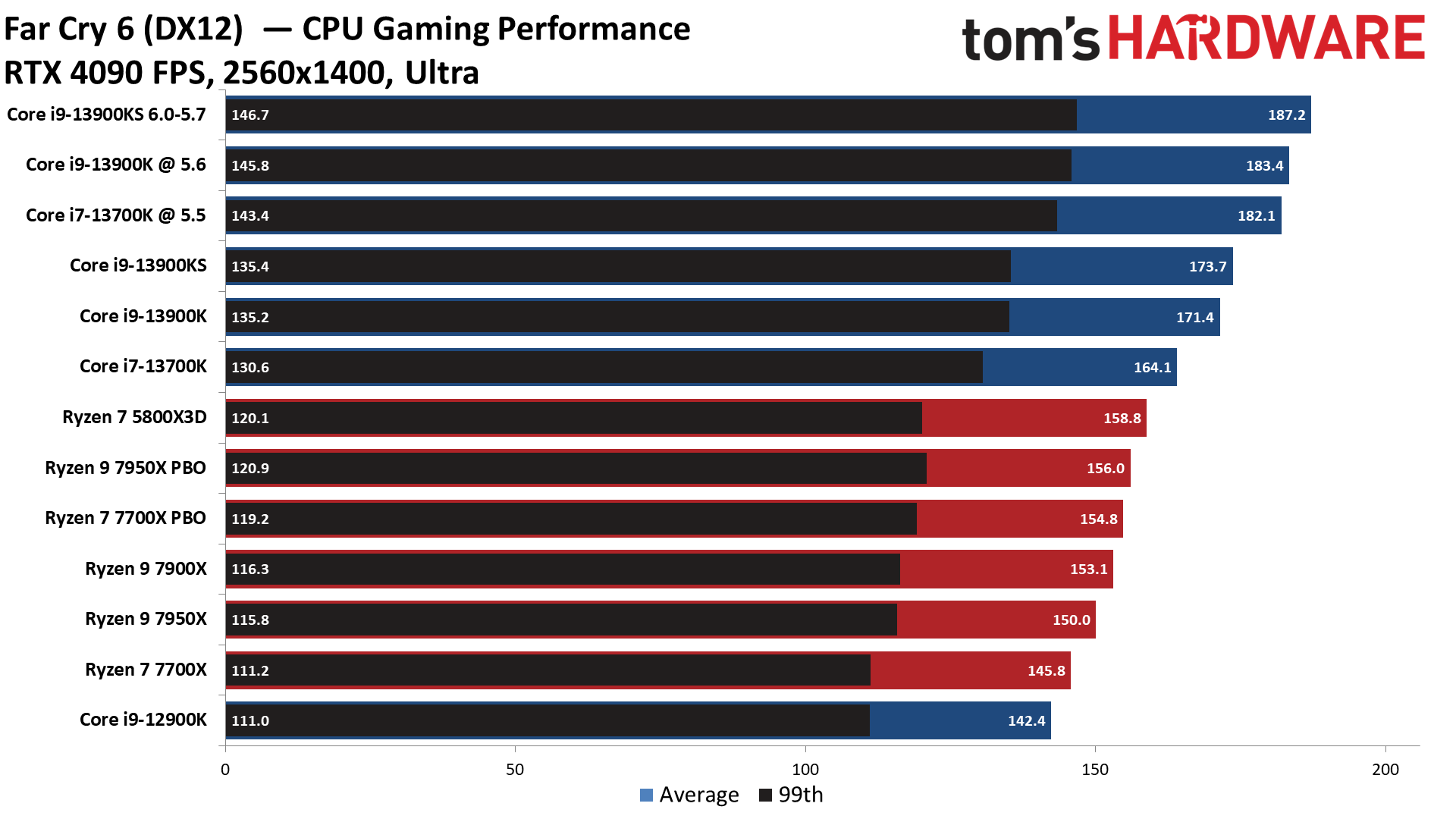
F1 2021 on Intel Core i9-13900KS
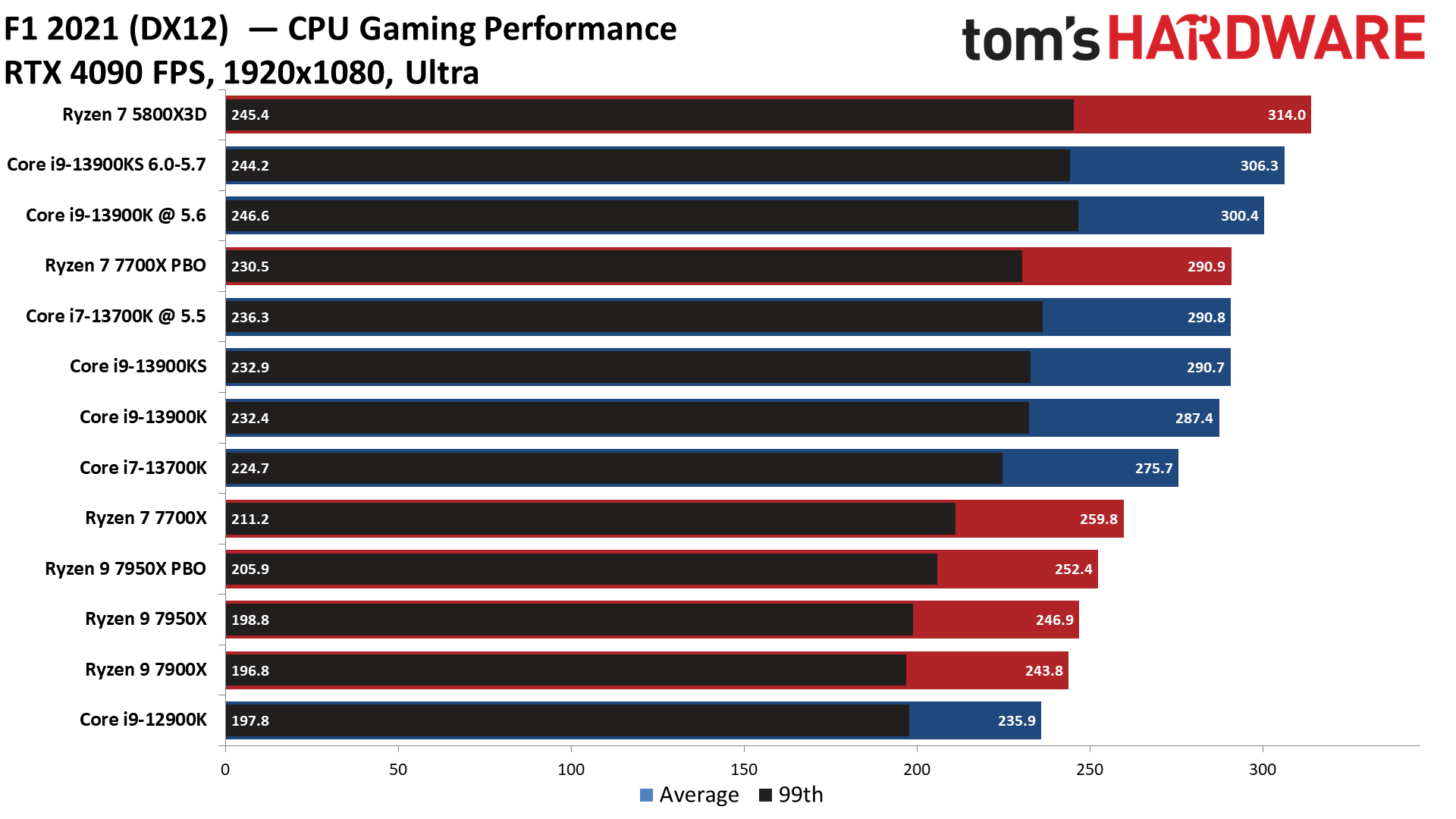
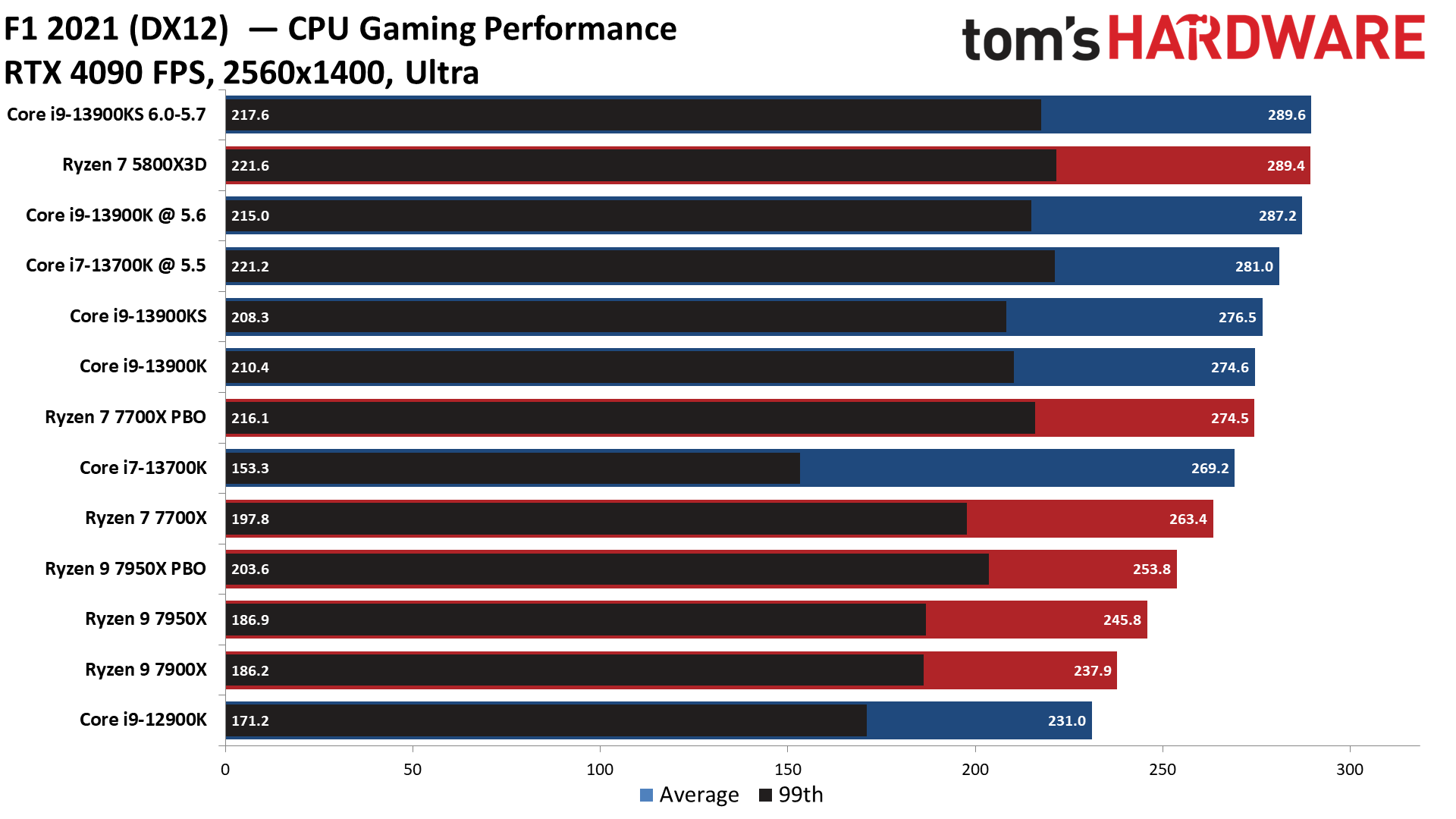
Hitman 3 on Intel Core i9-13900KS
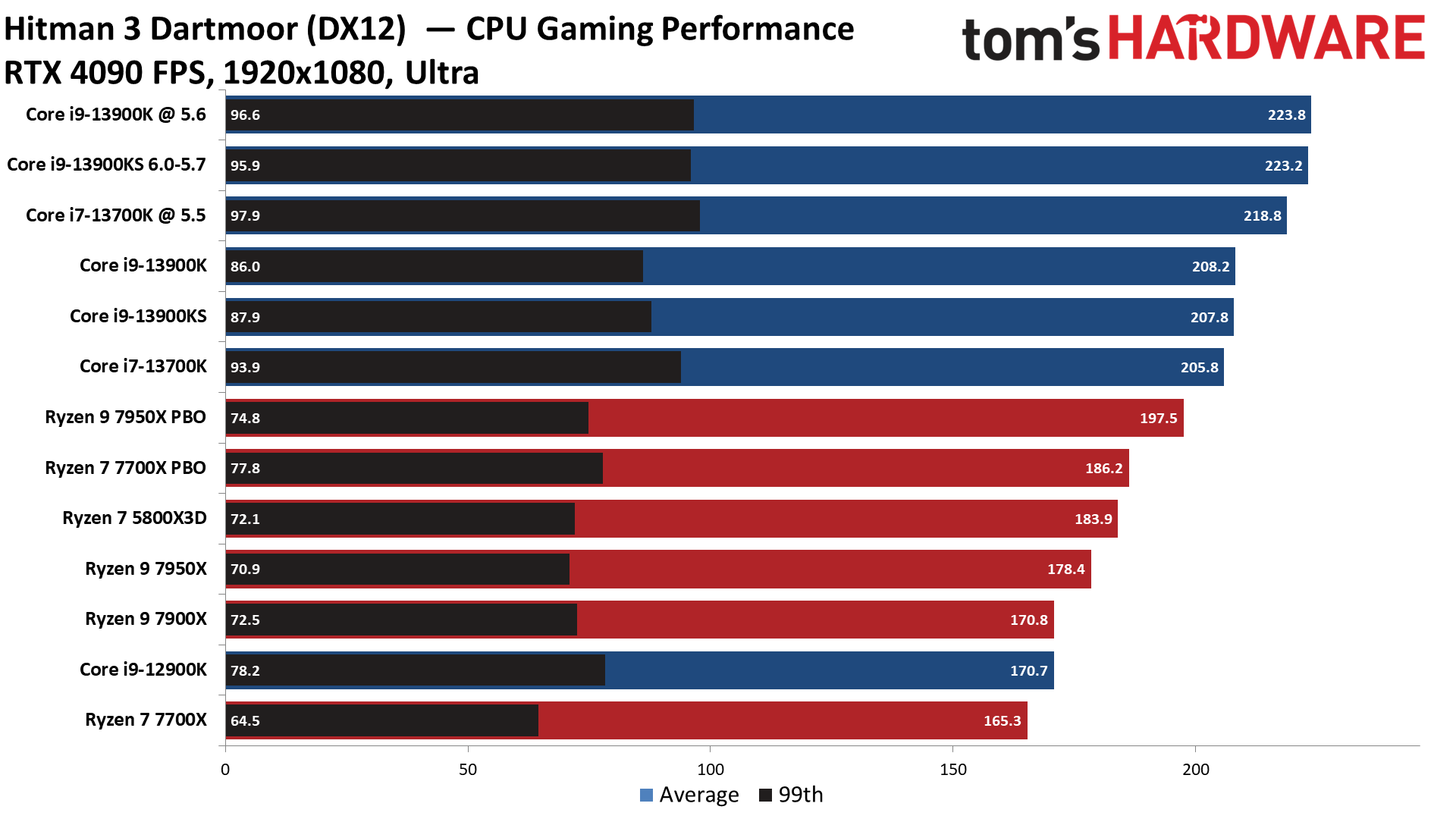
Microsoft Flight Simulator 2021 on Intel Core i9-13900KS
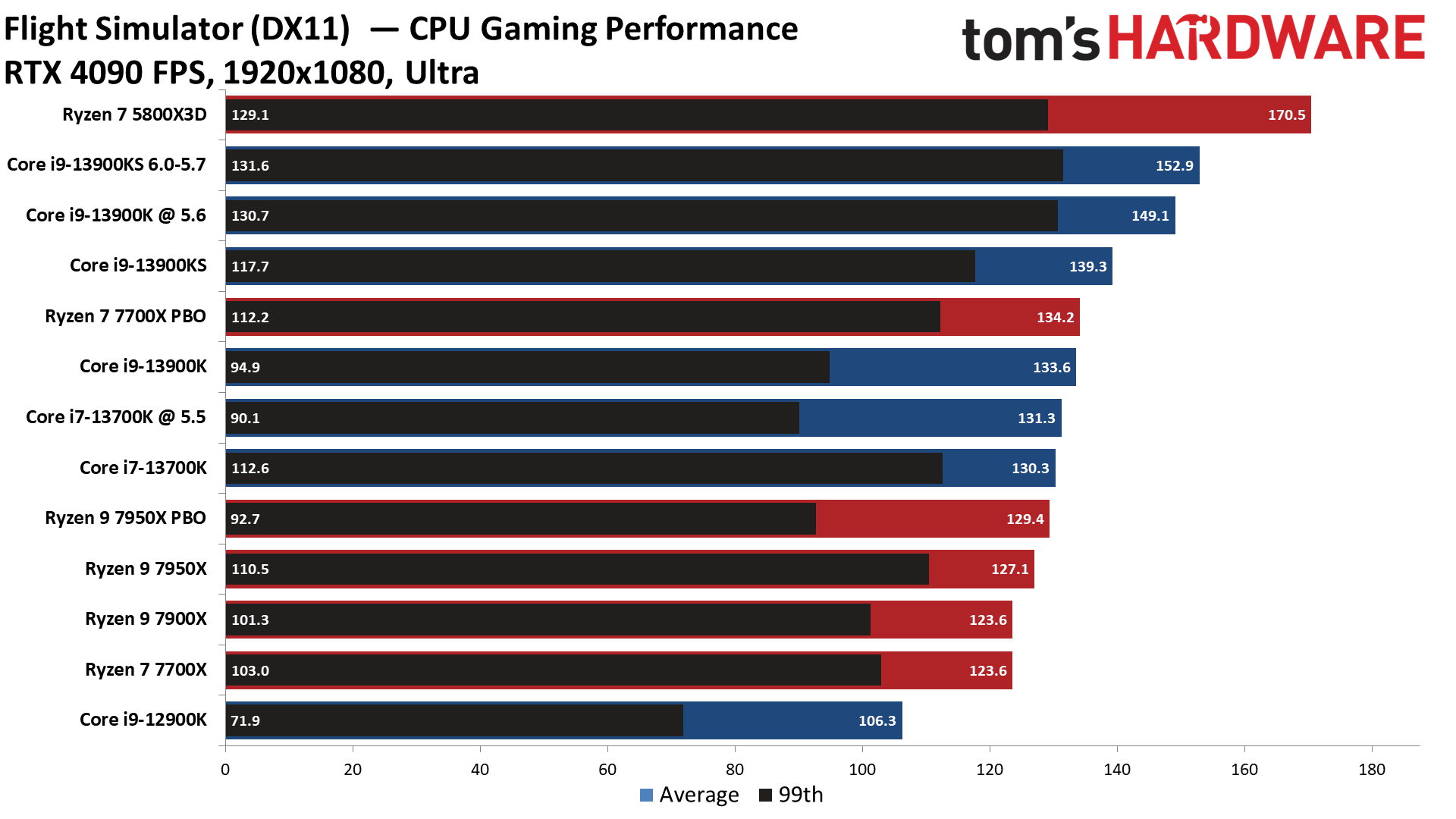
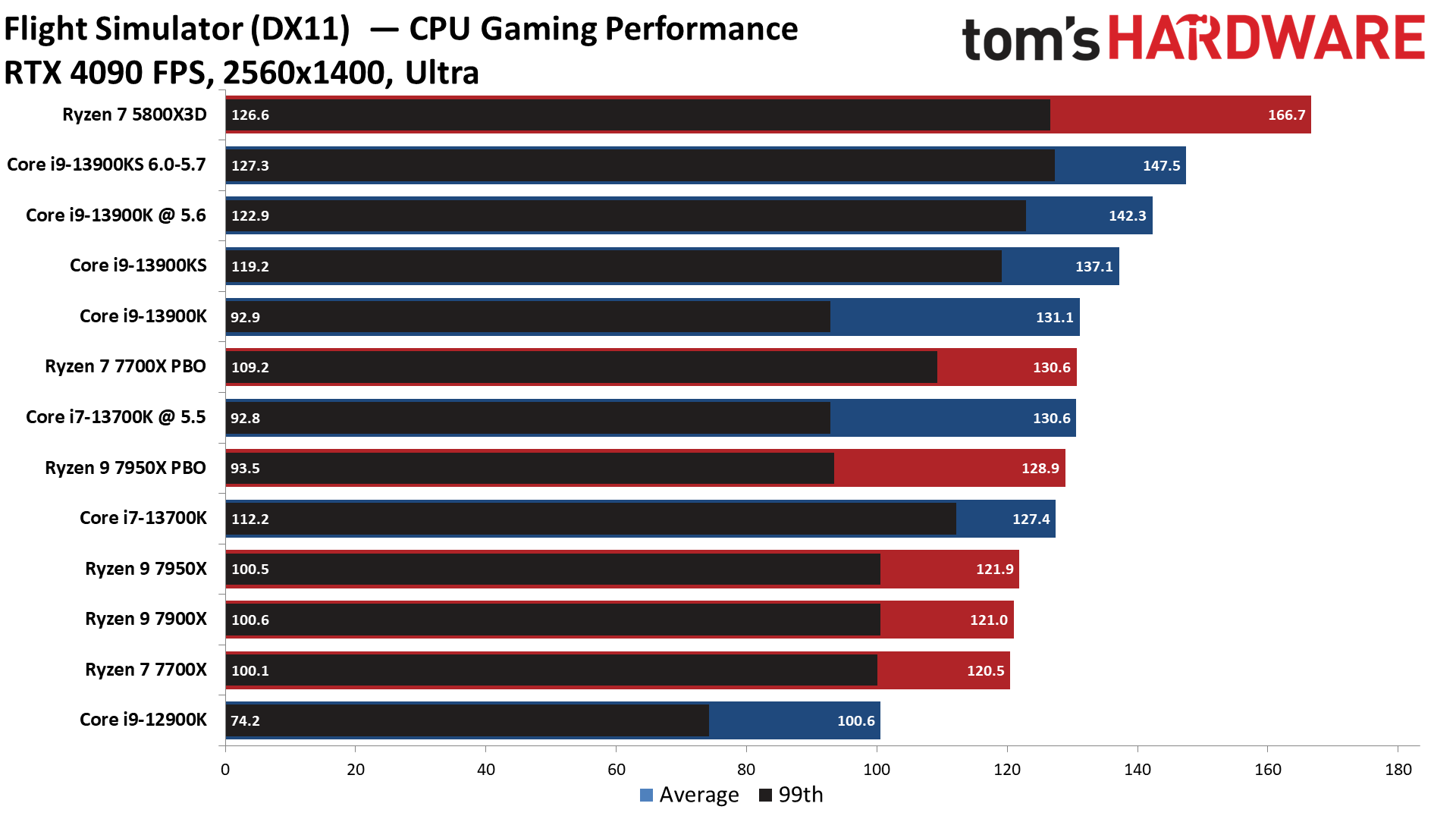
Microsoft Flight Simulator 2021 obviously benefits tremendously from L3 cache — the Ryzen 7 5800X3D is a whopping 28% faster than the Core i9-13900K flagship on this test. This large advantage is amazing but doesn't represent the 5800X3D's performance in most titles. It also illustrates how outliers can make the 5800X3D seem more impressive in cumulative measurements.
In either case, this does bode well for the Zen 4 Ryzen 7000X3D models, which should bring all the goodness of the capacious L3 cache with fewer tradeoffs in standard applications.
Red Dead Redemption 2 on Intel Core i9-13900KS
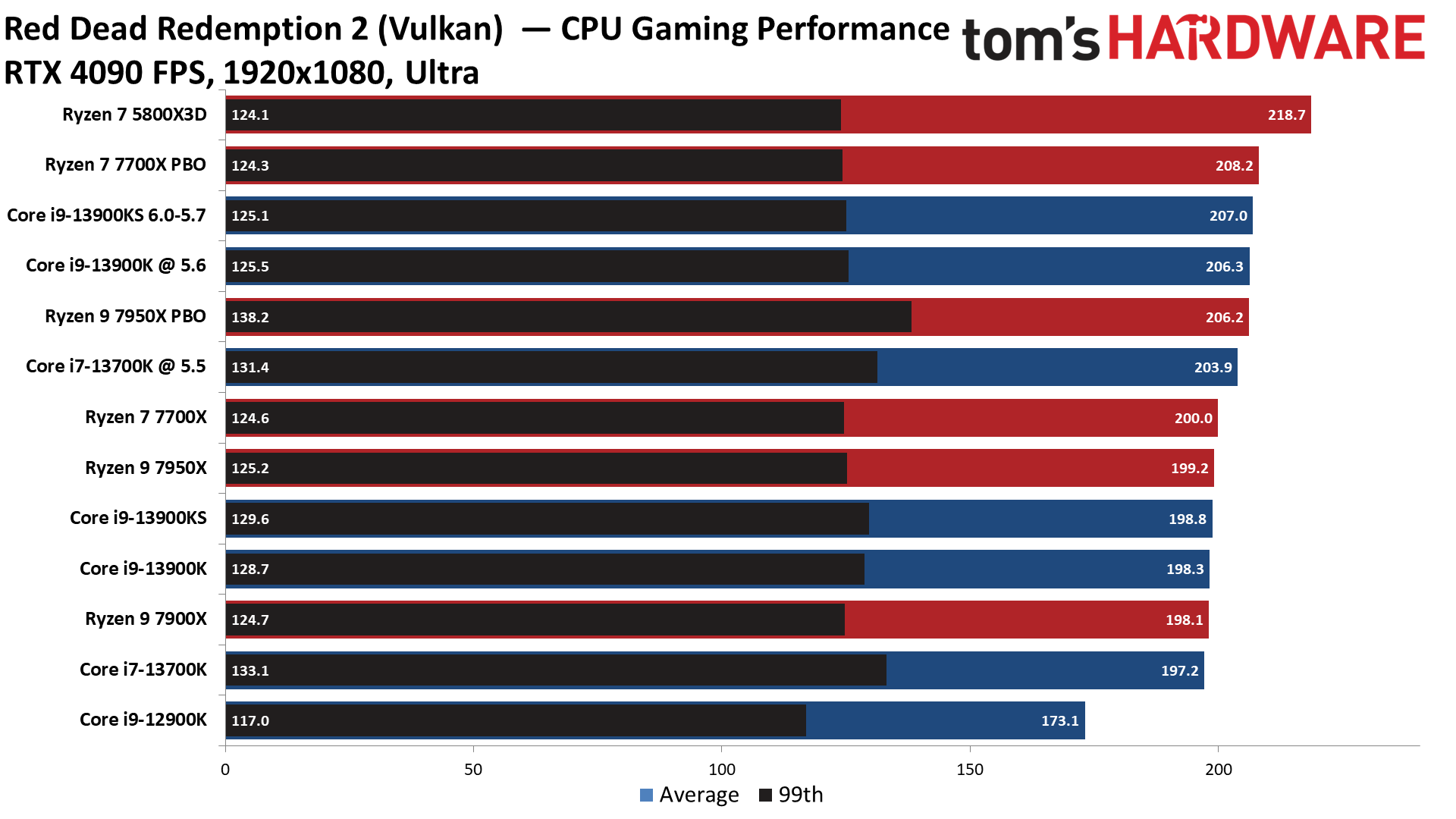
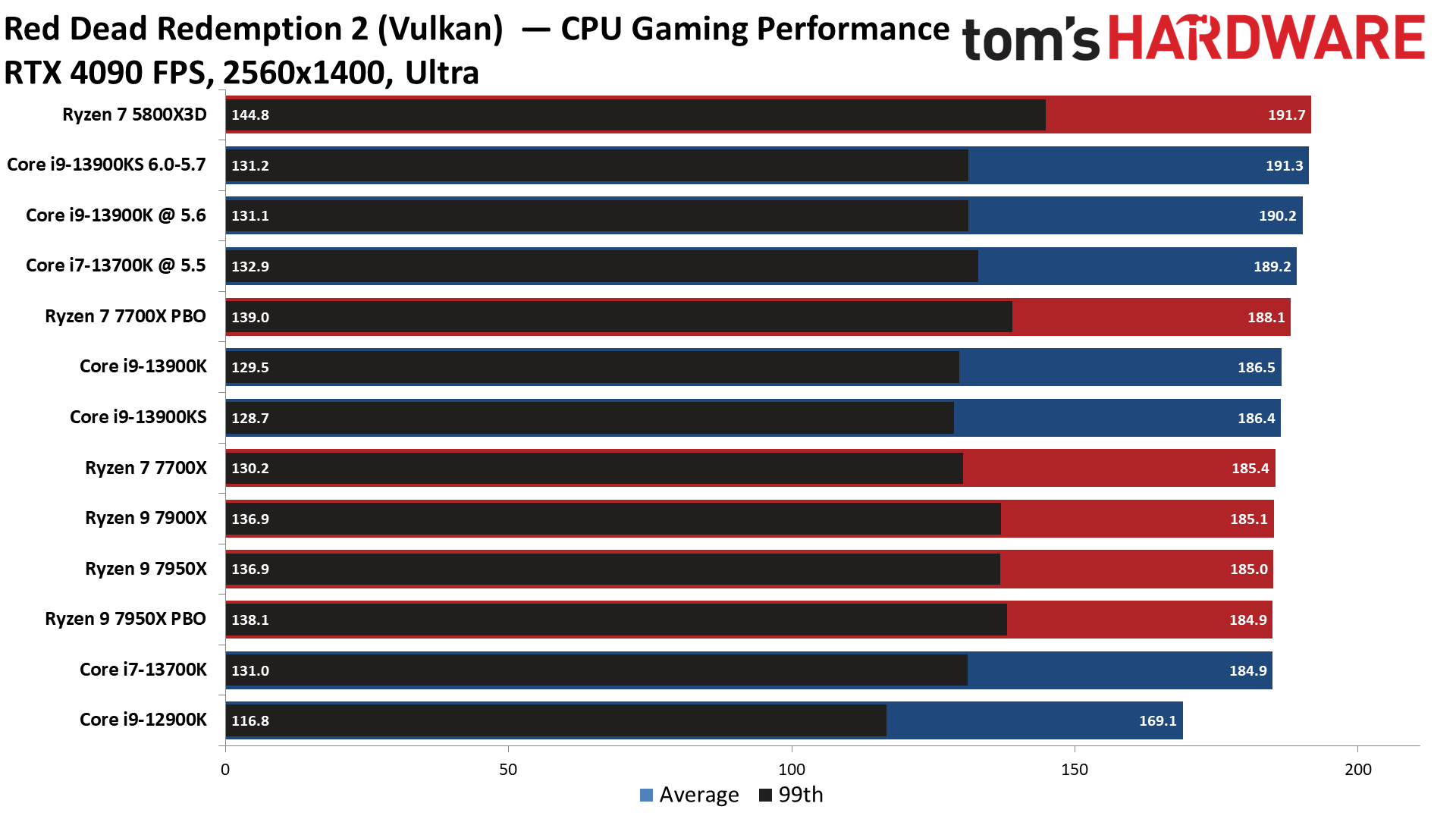
Warhammer 3 on Intel Core i9-13900KS
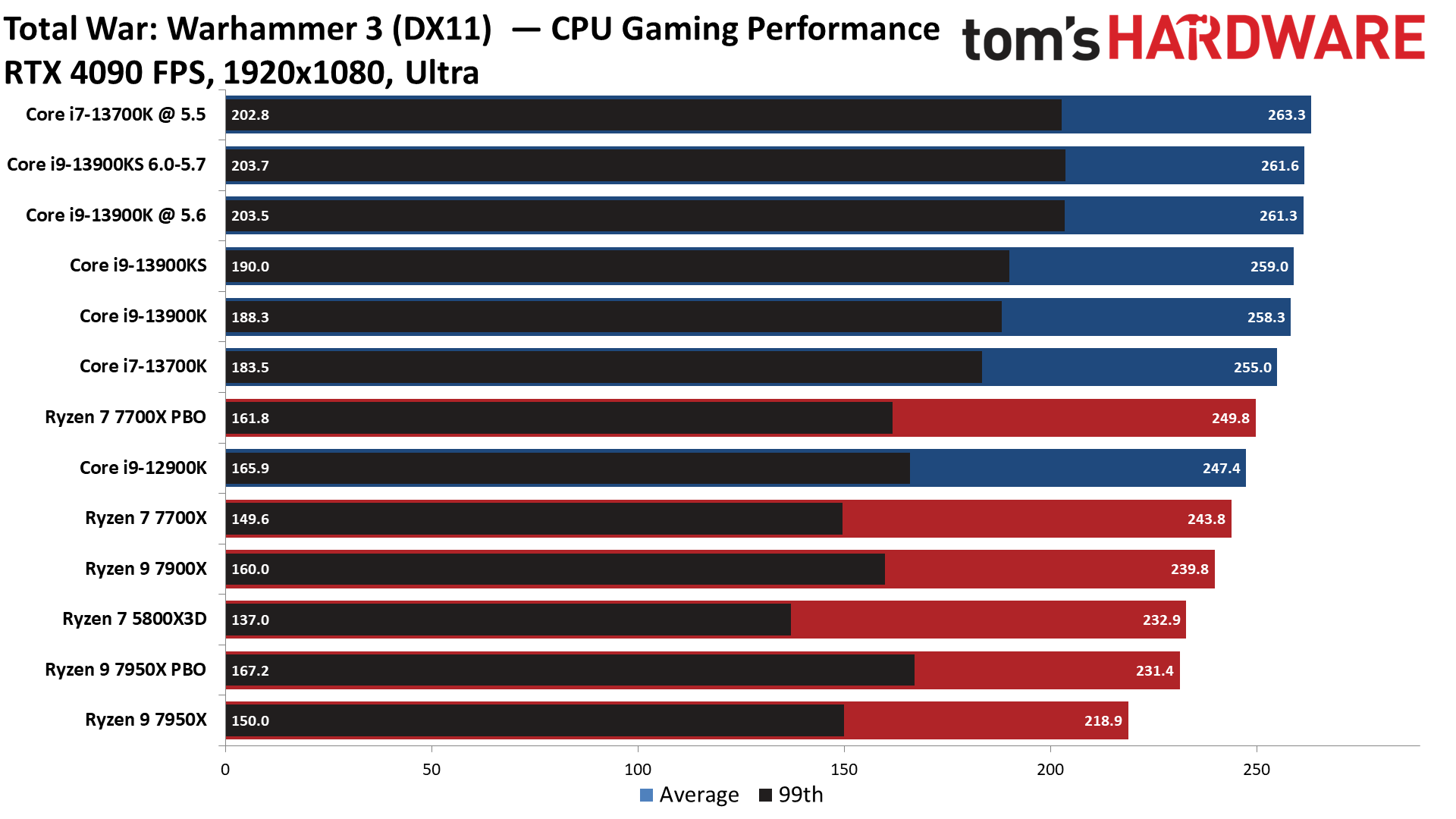
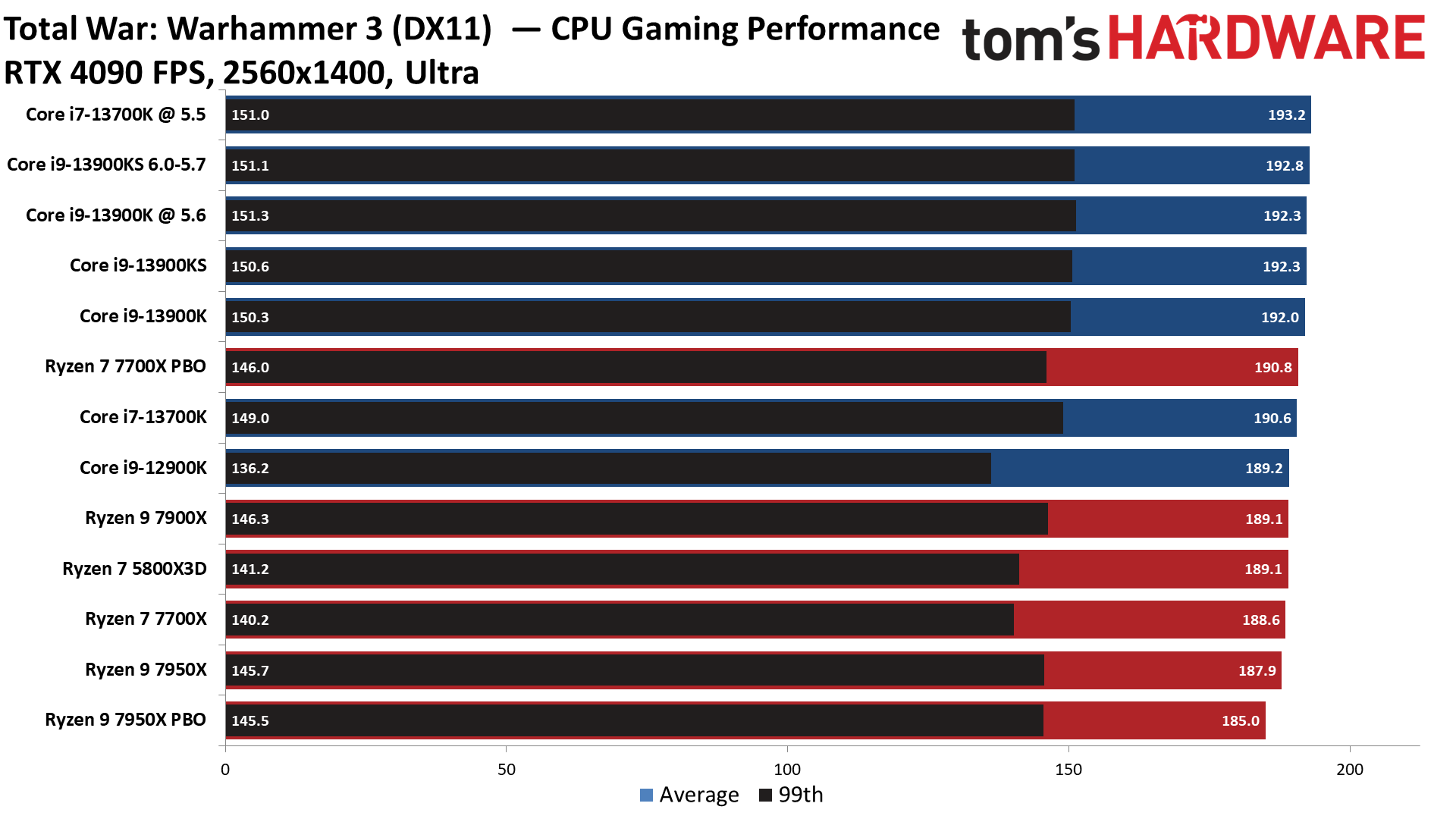
Flipping over to the 1440p charts shows us that higher resolutions are often the great equalizer that levels the playing field for chips with similar accommodations.
Watch Dogs Legion on Intel Core i9-13900KS
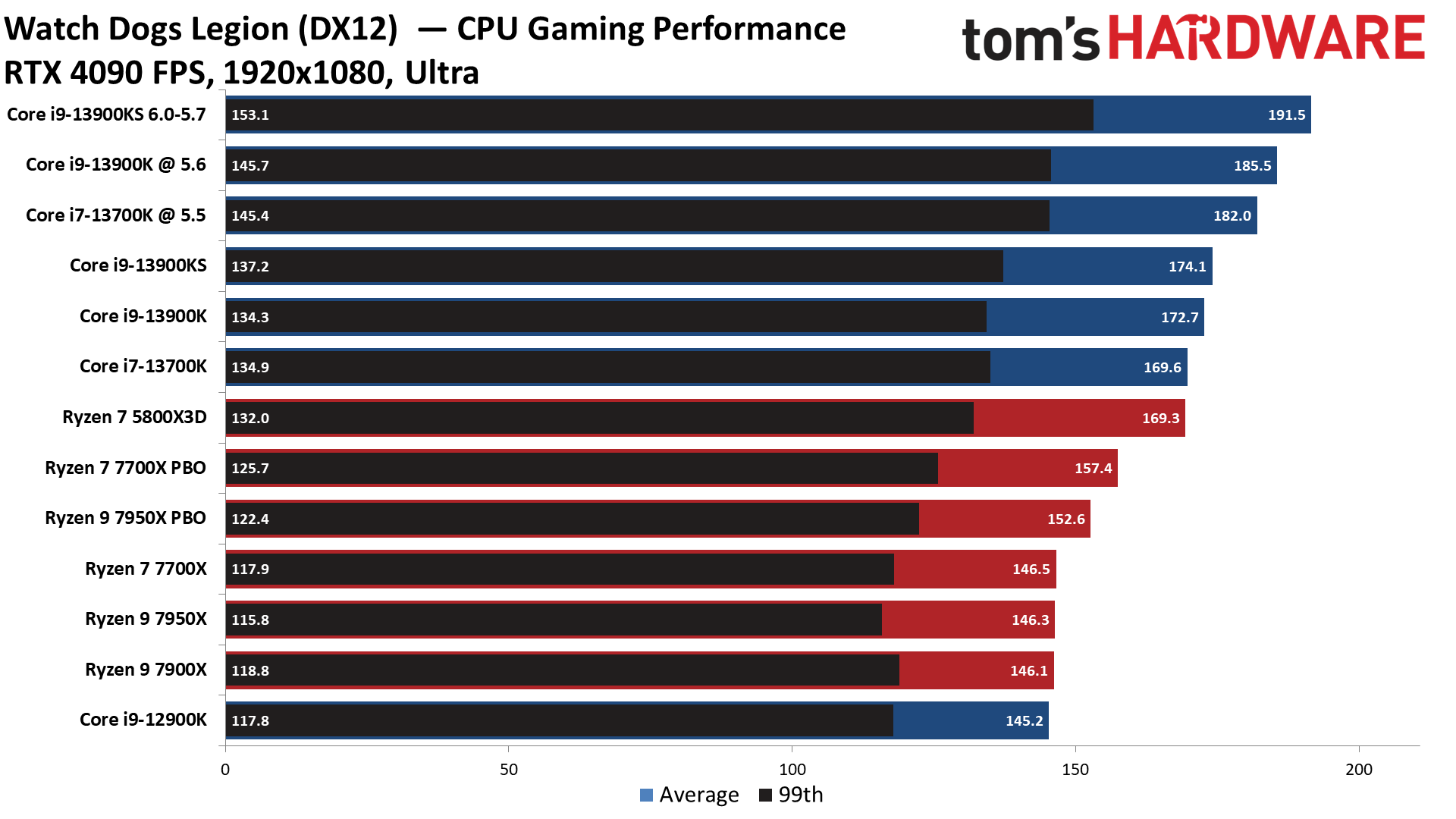
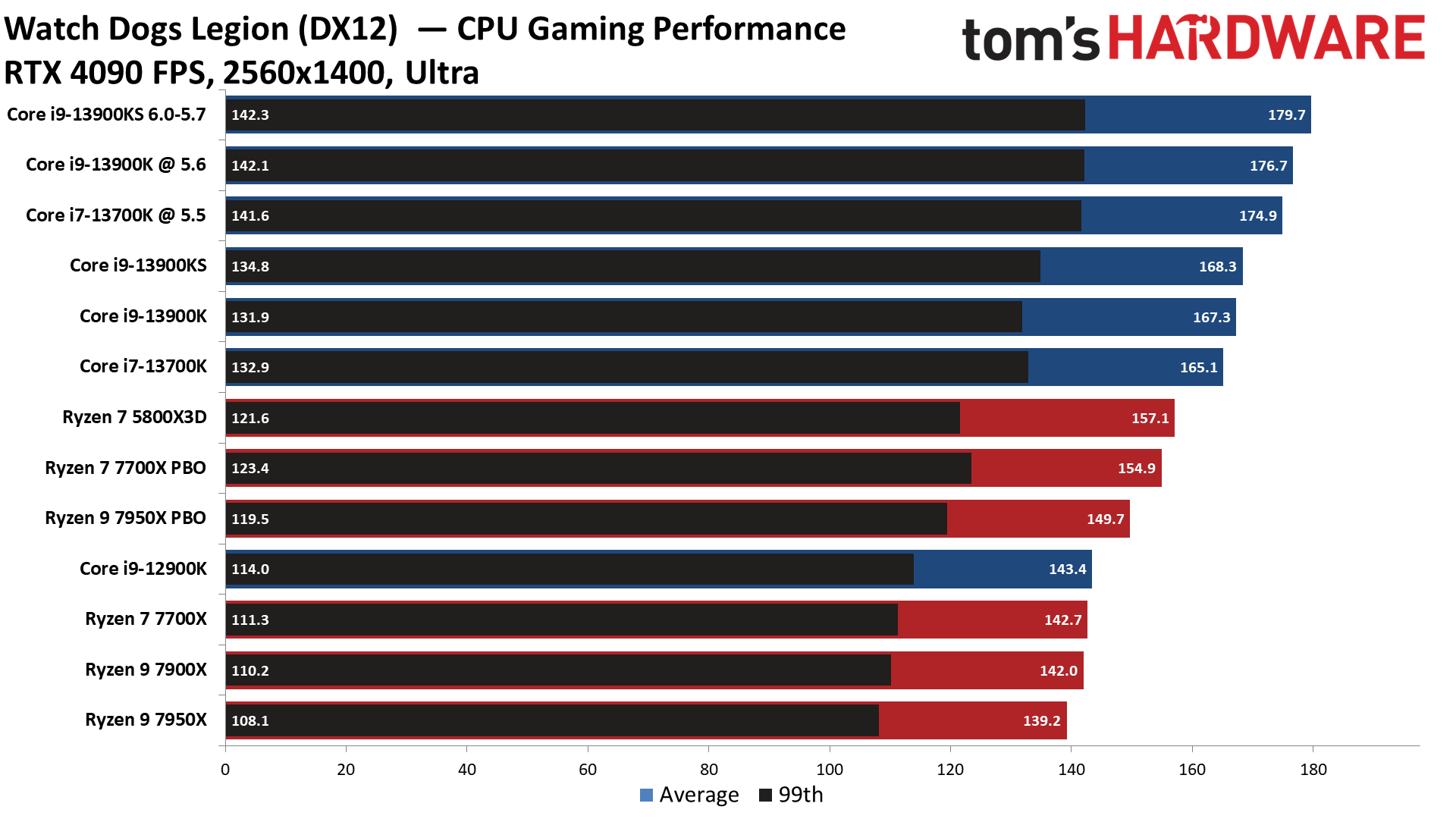
- MORE: AMD vs Intel
- MORE: Zen 4 Ryzen 7000 All We Know
- MORE: Raptor Lake All We Know
Get Tom's Hardware's best news and in-depth reviews, straight to your inbox.
Current page: Gaming Benchmarks on Intel Core i9-13900KS
Prev Page Intel Core i9-13900KS Overclocking, Power Consumption, Test Setup Next Page Productivity Benchmarks on Intel Core i9-13900KS
Paul Alcorn is the Editor-in-Chief for Tom's Hardware US. He also writes news and reviews on CPUs, storage, and enterprise hardware.
-
Brian D Smith Less 'overclocking' and more on 'underclocking' articles please.Reply
That would be helpful for the ever growing segment who does NOT need the testosterone rush of having the 'fastest' ... and wants more info on the logical underclocking to...well, do things like get the most out of a CPU without the burden of water-cooling, it's maintenance and chance of screwing up their expensive systems.
These CPU's and new systems would be flying off the shelves much faster than they are if only people did not have to take such measures for all the heat they generate. It's practically gone from being able to 'fry an egg' on a CPU to 'roasting a pig'. :( -
bit_user Seems like the article got a new comment thread, somehow. The original thread was:Reply
https://forums.tomshardware.com/threads/intel-core-i9-13900ks-review-the-worlds-first-6-ghz-320w-cpu.3794179/
I'm guessing because it had previously been classified as a News article and is now tagged as a Review. -
bit_user Thanks for the thorough review, @PaulAlcorn !Reply
Some of the benchmarks are so oddly lopsided in Intel's favor that I think it'd be interesting to run them in a VM and trap the CPUID instruction. Then, have it mis-report the CPU as a Genuine Intel of some Skylake-X vintage (because it also had AVX-512) and see if you get better performance than the default behavior.
For the benchmarks that favor AMD, you could try disabling AVX-512, to see if that's why.
Whatever the reason, it would be really interesting to know why some benchmarks so heavily favor one CPU family or another. I'd bet AMD and Intel are both doing this sort of competitive analysis, in their respective labs. -
letmepicyou Reply
Well, we've seen the video card manufacturers code drivers to give inflated benchmark results in the past. Is it so outlandish to think Intel or AMD might make alterations in their microcode or architecture in favor of high benchmark scores vs being overall faster?bit_user said:Thanks for the thorough review, @PaulAlcorn !
Some of the benchmarks are so oddly lopsided in Intel's favor that I think it'd be interesting to run them in a VM and trap the CPUID instruction. Then, have it mis-report the CPU as a Genuine Intel of some Skylake-X vintage (because it also had AVX-512) and see if you get better performance than the default behavior.
For the benchmarks that favor AMD, you could try disabling AVX-512, to see if that's why.
Whatever the reason, it would be really interesting to know why some benchmarks so heavily favor one CPU family or another. I'd bet AMD and Intel are both doing this sort of competitive analysis, in their respective labs. -
bit_user Reply
Optimizing the microcode for specific benchmarks is risky, because you don't know that it won't blow up in your face with some other workload that becomes popular in the next year.letmepicyou said:Is it so outlandish to think Intel or AMD might make alterations in their microcode or architecture in favor of high benchmark scores vs being overall faster?
That said, I was wondering whether AMD tuned its branch predictor on things like 7-zip's decompression algorithm, or if it just happens to work especially well on it.
To be clear, what I'm most concerned about is that some software is rigged to work well on Intel CPUs (or AMD, though less likely). Intel has done this before, in some of their 1st party libraries (Math Kernel Library, IIRC). And yes, we've seen games use libraries that effectively do the same thing for GPUs (who can forget when Nvidia had a big lead in tessellation performance?). -
hotaru251 Intel: "We need a faster chip"Reply
eng 1: what if we make it hotter & uncontrollably force power into it?
eng 2: what if we try soemthign else that doesnt involve using guzzling power as answer?
intel: eng1 you're a genius! -
bit_user Reply
Part of the problem might be in Intel's manufacturing node. That could limit the solution space for delivering competitive performance, especially when it also needs to be profitable. Recall that Intel 7 not EUV, while TSMC has been using EUV since N7.hotaru251 said:Intel: "We need a faster chip"
eng 1: what if we make it hotter & uncontrollably force power into it?
eng 2: what if we try soemthign else that doesnt involve using guzzling power as answer?
intel: eng1 you're a genius! -
froggx Reply
Intel has at least once in the past disabled the ability to undervolt. Look up the "plundervolt" vulnerability. Basically around 7th and 8th gen CPUs it was discovered that under very specific conditions that most users would never encounter, undervolting allowed some kind of exploit. The solution: push a windows update preventing CPU from being set below stock voltage. I have a kaby lake in a laptop that was undervolted a good 0.2v, knocked a good 10°C off temps. One day it started running hotter and surprise! I can still overvolt it just fine though, I guess that's what matters for laptops. Essentially, as useful as undervolting can be, Intel doesn't see it as something worthwhile compared to "security."Brian D Smith said:Less 'overclocking' and more on 'underclocking' articles please.
That would be helpful for the ever growing segment who does NOT need the testosterone rush of having the 'fastest' ... and wants more info on the logical underclocking to...well, do things like get the most out of a CPU without the burden of water-cooling, it's maintenance and chance of screwing up their expensive systems.
These CPU's and new systems would be flying off the shelves much faster than they are if only people did not have to take such measures for all the heat they generate. It's practically gone from being able to 'fry an egg' on a CPU to 'roasting a pig'. :( -
TerryLaze Reply
Being able to withstand higher extremes is a sign of better manufacturing not worse.bit_user said:Part of the problem might be in Intel's manufacturing node. That could limit the solution space for delivering competitive performance, especially when it also needs to be profitable. Recall that Intel 7 not EUV, while TSMC has been using EUV since N7.
Intel CPUs can take a huge amount of W and also of Vcore without blowing up, these are signs of quality.
TSMC getting better is how AMD was able to double the W in this generation.
You don't have to push it just because it is pushable.
jv3uZ5VlnngView: https://www.youtube.com/watch?v=jv3uZ5Vlnng